You can help grow History Buzz by sharing this post. It’s easy! To share this post via email use the Share button below, then click on Copy Link, and paste that into your email to Share the Buzz. Or use one of the other social media options.
Alice Hinton
When Alice Hinton graduated from Punchard High School in 1889. She presented her essay, “The Novel in Modern Life,” at the commencement.
Anyone who has been to an overly-long graduation ceremony will appreciate this Andover Townsman review of the 1889 graduation exercises.
Two gratifying characteristics were specially noticed in all these parts—which indeed ought not to be uncommon in any graduating exercises—they were all brief, and all upon themes in which their writers had some personal interest. This we understand, was the condition imposed upon each graduate in the selection of a subject, and ensured a series of plain, matter-of-fact compositions, containing the result of their writers' own observation or thought.
Among Alice’s fellow graduates were Perley F. Gilbert, architect, and Mary Louise Graffam, who, as a missionary to the Armenian community in Turkey during World War I, famously held her ground against the Turks and founded an orphanage.
Alice Hinton was a formidable young woman.
In 1889, she wrote a letter to the last person to enslave her father Allen Hinton, former Confederate General William Ruffin Cox of North Carolina.
Alice wrote to Cox, inviting him to the closing exercises of her graduation from Punchard Free School. Alice sent the letter via a friend of her father who lived in Raleigh, NC. The letter took some time to reach Cox, who lived in Kingsboro, NC, and he missed the graduation ceremony.
Cox’s letter back to Alice is in the collection of the History Center. In it, he wrote,
As I had not heard from your father since the close of the war, I inferred that he was among those who had passed over the river. You may then readily anticipate my surprise in receiving a letter from his daughter old enough to belong to the senior class of your school.
Had he received the letter sooner, he wrote, he would have sent Alice a little something for her graduation. The delay was, perhaps, a handy excuse to not send a gift.
After high school, Alice continued her education, studying piano at the Boston Conservatory of Music. She sang in the choir of Andover’s Baptist Church and was noted for her “pure soprano voice.”
Between the 1890s and the 1930s, the Townsman’s social column reported when Alice spoke or sung at local events, and when she catered functions, parties, and weddings. Alice was a popular vocal soloist who performed at events, gatherings, and churches, and she hosted musical events in her home.
In her youth Alice was treasurer of the Young People’s Literary and Social League. Later, she was a member of the Fortnightly Social Club. She attended and sang at her High School class reunions, including her 20th, which was reported in the Boston Globe, June 23, 1909.
Alice was active in the advancement of women and especially women of color.
Alice and Hinton Ice Cream were well-esteemed. In 1915 she was invited by Booker T. Washington to deliver the opening speech at the 16th Annual National Negro Business League Convention in Boston. The word-for-word transcription of the speech in the convention report reveals that Alice was an engaging and entertaining speaker. The transcript includes when her audience heartily applauded, laughed, and when they gave her an ovation.
Later, in 1934, Alice and number of local Andover women formed the Opportunity Club for the benefit of young women of color (Andover Townsman, November 16, 1934), and she was a member of the Haverhill Women’s Improvement Society.
The ice cream business
Between 1914 and 1921, after her mother Mary became infirm and could no longer work, Alice and her brother Edward carried on the ice cream business. Alice lived at home on Hidden Road.
By then Edward had married and was perhaps living outside Andover. Very little information about Edward has turned up. He registered for World War I in Georgetown, MA, but listed Andover as his residence. Hester Hinton was listed as his next of kin. In 1928, the newspaper reported that he was in town visiting his sister, but very little other information has emerged.
Alice lived at the homestead on Hidden Road until her mother died in 1921. The estate was willed to Alice and her brother. Alice purchased her brother’s share, split the property into two, and sold one part.
As told in the last article in this series, in 1921 the Townsman reported that Alice made improvements to the property and intended to add “Alice’s Waffle House” to the business. However, in March 1922, Alice sold the property.
After the family homestead was sold, Alice moved a number of times around Andover and out of town. Between 1923 and 1926, Alice was listed in the street directory as “Rem from Andover.” She was, perhaps, living in Boston at the time. The April 2, 1926 Townsman reported that she was back in town visiting from Boston.
A few months later, on September 25, 1926, Alice opened Hinton’s Lunch Box at 8 Central Street. In 1927, she ran a notice in the Townsman that Hinton’s ice cream could be purchased at the Lunch Box.
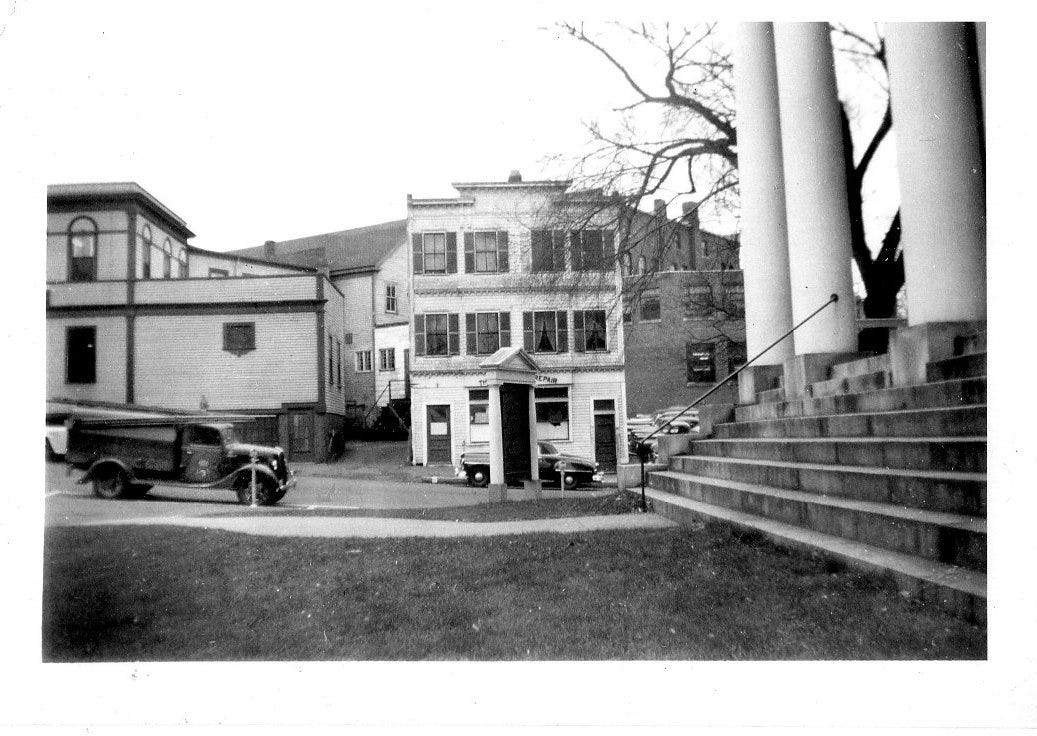
Alice ran Hinton’s Lunch Box from 1926 until 1930. During those years, she was as busy as ever. She hosted the Haverhill Women’s Improvement Society for a luncheon at the Lunch Box, and another for the hostess of the Franklin Square House in Boston. July 8, 1927, the Townsman reported that the “Alice M. Hinton Prize” was awarded by the Haverhill Women’s Improvement Society to an exemplary African American student of that city.
In July 1929 and again in 1931, the Townsman announced that Miss Alice Hinton would be spending the summer in Hyannis, Mass.
In the 1930 US Census, Alice at age 60 was listed as an “inmate” living at 80 Carmel Road. The facility, built in 1922, was variously referred to as the Andover Almshouse, Town Farm, Home for the Aged, and the Andover Town Infirmary. (You can read more about the facility on the Andover Historic Preservation website.) Given that Alice was up and around and vacationing in Hyannis in 1931, it’s likely that she was in the town hospital/infirmary for only a short time. Perhaps it was an accident of timing that she was there the day the census was taken. In the late 1920s, she lived for a time at 11 Bartlett Street and at 8 Central Street.
Between 1931 and 1934, Alice was again living outside Andover. The newspaper reported that she had moved to Sharon, Mass, to be the manager and cook of the Ponkapoag Inn.
Alice returned to Andover in 1935, where she was once again involved with local activities. In 1938, she donated photographs, memorabilia, and her written remembrances to the Andover Historical Society.
As long as she lived in Andover, Alice remained active in local activities. In 1938, she and number of others were guests of the birthday committee of the Courteous Circle of the King’s Daughters (South Church). She also helped organize and sell tickets to church and community events, such as the Ballardvale Liberal Arts Club.
In the 1940 US Census, Alice, age 70, was living as a border with Benjamin and Mabel Summers in Ballardvale.
“Dream comes true for Alice Hinton”
In May 1941, Alice organized a concert - and not just any concert - it was a dream come true.
The Townsman article the next day listed the performers, Helen Holiday, Sylvia Raye Joseph, John Powell, and Herman Carter, who were accompanied by Ella Roan Harris and Harold Evans. On the program were works by Handel, Chopin, Johnson, and Wagner, along with a selection of spirituals.
“They brought out the higher form of life last night,” Miss Hinton said.
“It was the first time such a group has appeared in Andover,” Miss Hinton concluded. “I hope it won’t be the last.”
Roxbury, Mass.
After living in Ballardvale for four years, in 1944 Alice moved to 16 Wyoming Street in Roxbury, Mass, where she lived for six years. She died in Roxbury in August 1951 following a long illness.
Alice was buried in Spring Grove Cemetery, alongside her parents.
A glimpse of who Alice Hinton was comes through the lists of dates and newspaper articles.
While still in high school, Alice wrote to the last person to enslave her father, inviting him to come see her success. It must have been a bold move for a young woman. Although we don’t have the letter Alice wrote to Mr. Cox, we can imagine the words she wrote expressing her pride in her and her family’s accomplishments.
Alice excelled in high school and at the New England Conservatory of Music. Throughout her youth and young adulthood, Alice was busy running the family business, seeking opportunity, and actively participating in the civic life of Andover. She was well-known as a performer, an engaging speaker, and liked to travel. Like her parents, Alice tried new business ventures. And she was surrounded by friends who cared for her throughout her life.
Since the writing of this post, and the post about Alice’s parents, new information has come to light. I look forward to sharing that with you in the near future.
Resources
Records of the National Negro Business League, 1900-1923
Report of the 16th Annual Convention of the National Negro Business League, 1915, 104-110, Alice Hinton’s speech
Alice Hinton’s remembrances, ACHC collection
Andover Townsman, Memorial Hall Library
US Census Records, Ancestry.com






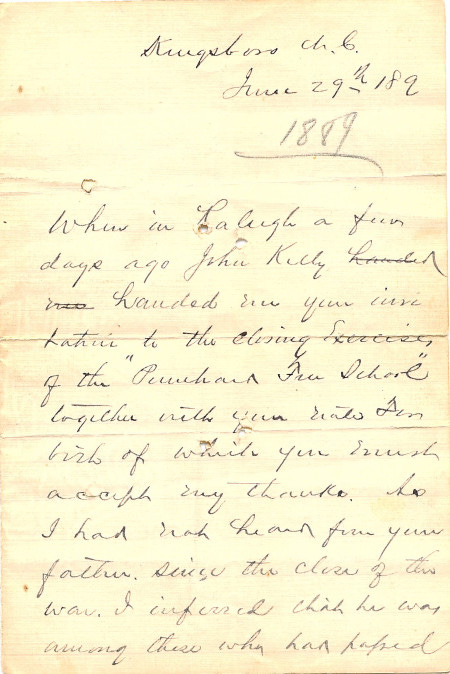
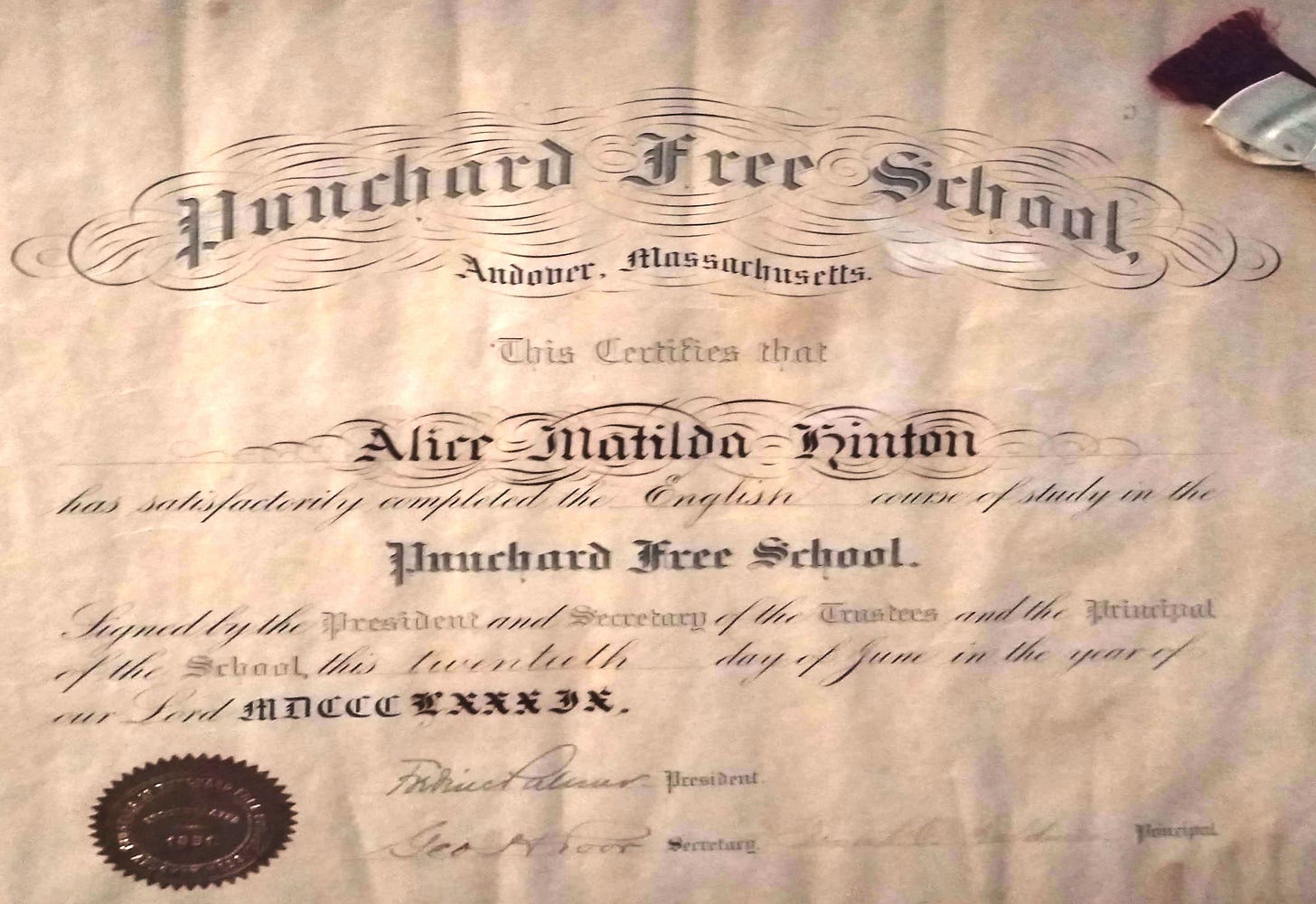

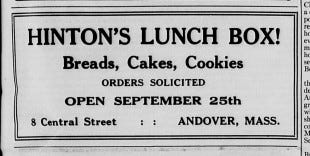
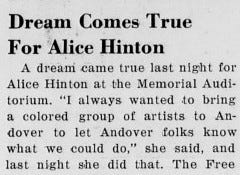

Fascinating story. Alice certainly was a women of strength and beauty.
Great story! How wonderful to have so many articles to show she was appreciated in her own time.